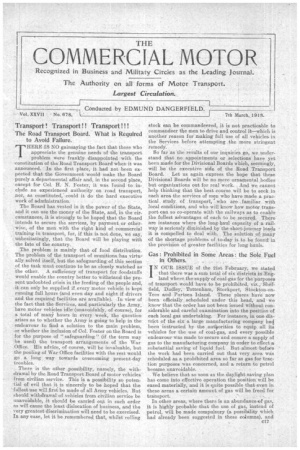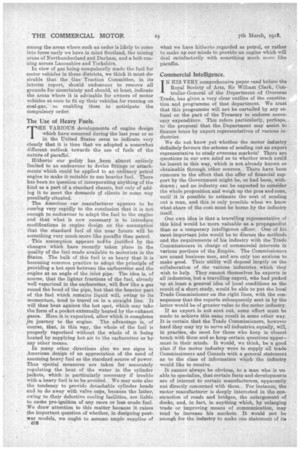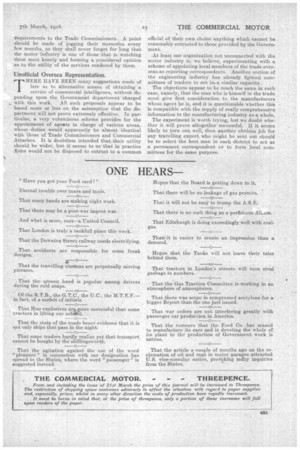_Transport ! Transport!! Transport!!!
Page 1

Page 2

Page 3

If you've noticed an error in this article please click here to report it so we can fix it.
The Road Transport Board. What is Required to Avoid Failure.
THERE IS NO gainsaying the fact that those who appreciate the genuine needs 'of the transport problem were frankly disappointed with the constitution of the Road Transport Board when it was announced. In the first place, it had not been expected that the Government 'would make the Board -purely a departmental affair and, in the second place, except for Col. H. N. Foster, it was found to include no experienced authority on road transport, nor, as constituted,could it do the hard executive work of administration.
The Board has vested in it the power of the State, and it can use the money of the State, and, in the circumstances, it is strongly to be hoped that the Board intends to secure the services, by payment or otherwise, of the men with the right kind of commercial training in transport, for, if this is not done, we say, unhesitatingly, that the Board will be playing with the fate of the country.
The problem is mainly that of food distribution. The problem of the transport of munitions.bas virtually solved itself, but the safeguarding of this section of the task must continue to be as closely watched as the other. A sufficiency of transport for foodstuffs would enable the country better to withstand the present undoubted crisis in the feeding of the people and, it can only be supplied if every motor vehicle is kept running full hours (and even day and night if drivers and the required facilities are available). In view of the fact that the Services, and particularly the Army, have motor vehicles idle(unavoidably, of course), for a total of mani. hours in every week, the question arises as to whether the Army is going to help in the endeavour to find a solution to the main problem, or whether the inclusion of Col. Foster on the Board is for the purpose of " safeguarding" (if the term may be used) 'the transport arrangements of the War Office. His advice, of course, will be invaluable, but the pooling of War Office facilities with the rest would, go a long way towards overcoming present-day troubles.
There is the other possibility, namely, the withdrawal by the Road Transport Board of motor vehicles" from civilian service. This is a possibility so potential of evil that it is sincerely -to be hoped that the fullest use will first be made of all Army vehicles. But should withdrawal of vehicles from civilian service be unavoidable, it should be carried ont in such order as will cause the least dislocation of business, and the very greatest discrimination will need to be exercised. In any case, let it be remembered that, whilst rolling stock can be commandeered, it is not practicable to commandeer the men to drive and control it—which is 'another reason for making full use of all vehicleS, in the Services before attempting the more stringent 'remedy. .
So far 'as the results of our inquiries go, we understand that no, appointments or -selections have yet been made for the Divisional Boards which, seemingly, will be the .executive side of the Road Transport Board. Let us again express the hope that these Divisional Boards will be no mere ornamental bodies but organizations out for real work. , And we cannot help thinking that the best course will be to, seek in each area the services of men who have made a pracaical, study of .transport, who are .familiar, with local conditions, and who will know how motor transport can so co-operate with the railways as to enable the fullest advantages of each to be secured. , There' are instances where the long-haul capacity of a. railway is seriously diminished by the short-journey loads it is compelled to 'deal with. The solution of, many of the shortage problems of :today is to be fetnict in the provision of greater facilities for long hauls.
Gas: Prohibited in Some Areas: the Sole Fuel in Others..
IN OUR ISSUE of the 21st February, we stated • that there was a sum total Of six districts in 'Eng land where the supply of coal-gas fOr the'parposes of transport would have to be prohibited, viz.,Shafield, Dudley, Tottenham, Stockport, Stockton-onTees and Portsea Island. -These places have now been officially scheduled under this head, and we know that the order has not been issued without considerable and careful examination into the position Of each local gas undertaking. For instance, in one district of the six a large manufacturing company had been instructed by the authorities to equip all its vehicles for the use of coal-gas, and every possible endeavour was made to secure and ensure a supply of gas to the manufacturing company in order to effect a substantial saving of liquid fuel. But almost before the work had been carried out that very area was scheduled as a prohibited area so far as gas, for trac, tion purposes was concerned, and a return to petrol became unavoidable. • We believe that so soon as the daylight saving plan has come into effective operation the position' will be eased materially, and it is quite possible that es-en in these areas a certain amount of gas will be freed for transport. ' , . . In other areas, where there is an abundance of gas, it is highly probable that the use of gas, instead of petrol, will be made compulsory (a possibility which had already been suggested in these columns), and among the areas where such an order is likely to come into force early we have in mind Scotland, the mining areas of Northumberland and Durham, and a belt running across Lancashire and Yorkshire.
In view of gas being compulsorily made the fuel for motor vehicles in these districts, we think it most desirable that the Gas Traction Committee, in its interim report, should endeavour to remove all grounds for uncertainty and. should, at least, indicate the areas where it is advisable for owners of motor vehicles at once to fit up their vehicles for running on coal-gas, so enabling them to anticipate the compulsory order.
The Use of Heavy Fuels.
THE VARIOUS developments of engine design which have occurred during the last year or so in the United States seem to indicate very dearly that it is time that we adopted. a somewhat different outlook towards the use of fuels of the nature of paraffin.
Hitherto our polity has been almost entirely limited to an endeavour to devise fittings or attachmeats 'which could be applied to an ordinary petrol engine to make it suitable to use heavier fuel. There has been no 'question of incorporating anything of the kind as a part of a standard chassis, but only of adding it to meet the demands of clients in some way peculiarly situated.
The American ear manufacturer appears to be coming very rapidly to the conclusion that it is not enough to endeavour to adapt the fuel to the engine and that what is now necessary is to introduce modifications in engine design on the assumption that the standard fuel of the near future will be something very much more like paraffin than petrol.
This assumption appears totbe justified by the changes which have recently taken place in the quality of the fuel,macle available to motorists in the States. The bulk of this fuel is so heavy that it is becoming common practice to adopt the principle of providing a hot spot between the carburetter and, the engine at an angle of the inlet pipe. The idea is, of course, that the lighter fractions of the fuel, already well vaporized in the carburetter, will flow like a gas round the bend of the pipe, but that the heavier, part of the fuel which remains liquid will, owing to its momentum, tend to travel on hi a straight line. It will thus beat against the hot spot, which may take the form of a pocket externally heated by the exhaust gases. Here it is vaporized, after which it completes ,its journey to the engine. The advantage is, of course, that, in this way, the whole of the fuel is properly vaporized without the whole of it being heated by supplying hot air to the carburetter or by any other means.
In many other directions also we see signs in American design of an appreciation of the need of assuming heavy fuel as the standard source of power. Thus special measures are taken for accurately regulating the heat of the water in the cylinder jackets, which is particularly necessary if trouble with a heavy fuel is to be avoided. We may note also the tendency to provide detachable cylinder heads and to do, away with valve caps, because the latter, owing to their defective cooling facilities, are liable to eatese pre-ignition of any more or less crude fuel. We draw attention to this matter because it raises the important question of whether, in designing post war models, we ought to assume ample supplies, of 018 what we have hitherto regarded as petrol, or rather to make up our-minds to provide an engine which will deal satisfactorily with something much more like paraffin,
Commercial Intelligence.
IN HIS VERY comprehensive paper read before the Royal Society of Arts, Sir William. Clark, Controller-General of the Department of Overseas Trade, has given a very clear outline of the constitution and programme of that department. We trust that this programme will not be curtailed by any refusal on the part of the Treasury to endorse necessary expenditure. This refers particularly, perhaps, to the proposal that the Department may assist to finance tours by expert representatives of various industries.
We do not know yet whether the motor industry definitely favours the scheme of sending out an expert representative to study overseas markets.' There are questions in our own mind as to whether much could be learnt in this way, which is not already known or obtainable through other sources. There have been rumours to the effect that the offer of financial support by the Government might be, or had been, withdrawn ; and no industry can be expected to consider the whole proposition and weigh up the pros and cons, until it is possible to estimate the cost of sending out a man, and this is only possible when we know what share of the cost must be borne ,by the industry itself.
Our own idea is that a. travelling representative of this kind would be more valuable as a propagandist than as a temporary intelligence officer. One of his ' most important jobs would be to discuss the methods and the requirements of his industry with the Trade • Commissioners in charge of cornmereiaI interests in • various portions of the Empire. The Commissioners are sound business men, and are only too anxious to make good. Their utility will depend largely on the collaboration of the various industries which they wish to help. •They cannot themselves be experts in all industries, but a travelling expert, who had picked up at least a general idea of local conditions as the result of a short study, would be able to put the local Trade Commissioner on the right lines, with the consequence that the reports subsequently sent in by the latter would be of greater value to the motor industry.
If an expert is not sent out, some effort must be made to achieve this same result in some other way. It is certain that the Trade Commissioners, however hard they may try to serve all industries equally, will, in practice, do. most for those who keep in closest touch with them and SO keep certain questions upper— ' most in their minds. It would, we think, be a good plan if the motor industry were to supply all trade Commissioners and Consuls with a general statement as to the class of information which the industry would like to receive.
It cannot always be obvious, to a, man who is unable to specialize, that certain facts and developments are of interest to certain manufacturers, apparently not directly concerned with them. For instance, the motor manufacturer is deeply interested in the construction of roads and bridges, the enlargement of docks, and, in fact, in anything which, by enlarging trade or improving means of communication, may tend to increase his markets. It would not be enough for the industry to make one statement of its requirements to the Trade Commissioners. A point should be made of jogging their memories every few months, so they shall never forget for long that the motor industry is one of those that is watching them most keenly and forming a considered opinion as to the utility of the services rendered by them.
Unofficial Oversea Representation. .
THERE HAVE BEEN many suggestions made of late as to alternative means of obtaining a service of commercial intelligence, without depending upon the Government department charged with this work. All such proposals appear to be based more or less on the asiumption that the department will not prove extremely effective. In particular, a very voluminous scheme provides for the appointment of agents in charge of various areas, whose duties would apparently be almost identical with those of Trade Commissioners and Commercial Attaches. It is doubtless intended that their utility should be wider, but it seems to us' that in practice firms would not be disposed to entrust to a common official of their own choice' anything which cannot be reasonably entrusted to those provided by the Government.
At least one organization not unconnected with the motor industry is, we believe, experimenting with a scheme of appointing local members of the trade overseas as reporting correspondents. Another section of the engineering industry has already kirmec1 committees of traders to act in.a similar capacity.
The objections appear to he much the same in each ease, namely, that the man who is himself in the trade must give first consideration to the manufacturers whose agent he is, and it is questionable whether this is compatible with the supply of really comprehensive information to the manufacturing industry as a whole.
The experiment is worth trying, but we doubt whether it will prove altogether successful. If it seems likely to turn out, well, then another obvious job for any travelling expert who might be sent out should be to select the best man in each district to act as a permanent correspondent or to form local committees for the same purpose.






















